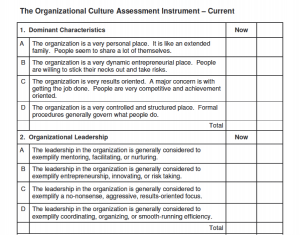| Organizational Culture Assessment Instrument (OCAI) | |
| The OCAI is a 24-item instrument used to assess 6 key dimensions of organizational culture, such as Organizational Leadership and Strategic Emphases. | |
|
Evidence-Based Assessment Rating Profile
|
Sample Items |
| Link to main document: OCAI | |
| Relevant Literature:
|
|
Organizational Culture Assessment Instrument (OCAI)SIRCTeam2016-11-17T01:52:06-06:00


